Presented by “Harry Potter and the Reread Project”
The penultimate part of Harry Potter and the Half-Blood Prince starts with Harry discussing the memory Dumbledore showed him of the young Tom Riddle with Ron and Hermione, and then moves on to a discussion of Slughorn’s Christmas party and the first really visible romantic tension between Ron and Hermione. Those three topics essentially continue to dominate this quarter of the book, although Harry also occasionally swoons over Ginny and obsesses over Draco Malfoy. He also finally receives actual proof that Draco is up to no good.
Dwindling Convictions
As I already said in my last Reread post, it’s not surprising that Harry believes that Draco has been recruited by Voldemort, especially because he overheard Draco essentially admit it. Apart from that confession, which is easily hand-waved as him being a show-off, Harry’s conviction rests entirely on conjectures, like Harry assuming that Draco has the Dark Mark because he flinched when Madame Malkin touched his left arm. There’s also a bunch of evidence pointing away from Draco, like the fact that he couldn’t have smuggled a cursed object into Hogwarts, that nothing was found at the Malfoy residence and that he couldn’t have been in Hogsmeade to give the cursed necklace to Katie Bell.
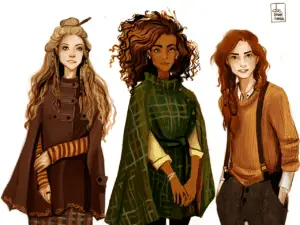
I also understand why Ron and Hermione don’t share Harry’s convictions. As I said in the comments on my last piece, they have a vested interest in being willfully blind about Draco: as long as they can remain convinced that Voldemort wouldn’t suck a sixteen-year-old other than Harry himself into this war, they can continue to pretend that they aren’t going to be affected much.
It’s, on the one hand, a nonsensical position. They’ve already been thoroughly affected by the war, considering that they formed a self-defense organisation and fought at the Ministry. On the other hand, if I had been involved in the fight in the Department of Mysteries as a fifteen-year-old and almost died, I’d want nothing more than to go back to my normal life and not be involved in the war against Voldemort.
Still, JKR doesn’t manage to actually show that this could be why Ron and Hermione don’t believe Harry. She generally doesn’t allow them – or Neville, Ginny or Luna – any kind of emotional reaction to what happened at the Ministry. So me finding their disbelief understandable is probably based more on my own head-canoning than on what JKR actually put into the text.
It’s interesting because I’ve noticed that I’m still willing to give JKR more leeway than other readers. As I’ve said right from the beginning, I’ve always loved Harry Potter, it’s been an incredibly formative influence over the years, and although the first five books have gripped and sucked me in the way they always do, that’s not happening as much with Half-Blood Prince. It’s kind of sad to fall out of love with something, so that’s why I’ve been willing to overlook the fact that JKR didn’t write Ron and Hermione’s behaviour convincingly.
Reoccuring Suspicions
What I really liked about Half-Blood Prince is that when Harry overhears Snape trying to convince Draco to accept his help, he immediately jumps back onto the “Snape is evil”-train. Harry has incredibly good reasons to dislike Snape: he’s generally abusive and unpleasant and he’s always been especially abusive to Harry, to the point where Snape essentially used the crucial task of teaching Harry Occlumency to further degrade and humiliate him. However, Harry has been proven wrong about Snape being a Death Eater three times now: once, in Philosopher’s Stone, when he was trying to protect Harry and stop Quirrel, then again in Goblet of Fire, when Snape only went back to Voldemort’s side on Dumbledore’s orders and then again in Order of the Phoenix, when it was Snape who alerted the Order.
The fact that despite overwhelming evidence to the contrary, Harry immediately assumes that Snape must be working for Voldemort rather than Dumbledore makes perfect sense considering how many reasons he has to assume the worst of Snape, but it’s also irrationally ignoring the evidence at hand. At the same time, despite Harry seeing that Snape worked for Dumbledore in the past and knowing that Dumbledore trusts him, neither Harry nor we, the readers, actually find out why until Deathly Hallows. As Remus so rightly said, the question of whether or not you trust Snape fundamentally becomes a question of trusting Dumbledore’s authority, and although Harry doesn’t openly question or defy Dumbledore, he’s unwilling no longer willing to unquestioningly accept Dumbledore’s authority.
This also becomes clear when Dumbledore tells Harry that he shouldn’t worry about what he overheard Snape and Draco discuss. Harry is rightfully irritated: he has proof that Draco is planning something on Voldemort’s orders, reveals this to Dumbledore and the only thing Dumbledore says is:
“Thank you for telling me this, Harry, but I suggest that you put it out of your mind. I do not think that it is of great importance.”
Dumbledore again gives zero explanation of his behaviour: he doesn’t explain to Harry why he believes that what he overheard is unimportant and, although he later makes it clear that he trusts Snape, he once again doesn’t explain why. Neither makes a lot of sense — what would it hurt to explain to Harry why Snape switched sides? — but it makes no sense at all that Dumbledore doesn’t even trust Harry enough to tell him that he knows that Draco is planning something and that Snape is acting on his orders.
As Cynical Classist pointed out in this comment on my last post, Harry being left in the dark led to a lot of bad things happening in his fifth year, including Sirius’s death, and Dumbledore promised to be honest with Harry. So why doesn’t he tell Harry that he gave Snape the order to keep an eye on Draco?
It doesn’t even make sense on the narrative level: in both cases, the “plot twist” moment and shock that the reader feels when Snape kills Dumbledore would be just as great as it is if the readers and Harry are in doubt about Snape’s loyalties. In fact, it would probably be even greater if we’d been convinced that Snape changed sides because of his guilt over causing Lily’s death but then seemingly turned on Dumbledore again. Additionally, it would be possible to reveal that Snape was in love with Lily but responsible for her death and tasked to keep an eye on Draco without revealing that Dumbledore asked to kill him or that Harry needed to die himself, thus preserving those two (in my opinion more important) twists for the seventh book.
At the same time, if Dumbledore hadn’t dismissed Harry’s concerns and instead revealed part of his plan to Harry, Harry might not have kept investigating Draco which would have meant that Harry and Draco probably wouldn’t have dueled in the bathroom. But I think the same result could have been achieved even if Dumbledore had told Harry that he knew about Draco’s mission. Harry’s distrust of Snape, for example, could have easily led him to believe that Snape wasn’t doing his jon properly, thus making him want to keep an eye on Draco anyway.
Additionally, as far as I can remember, JKR never gives us an explanation as to why Dumbledore just dismisses Harry’s concerns about Draco. There’s no logical or obvious reason for his behaviour either, except Dumbledore’s fundamental mistrust of others—something that he, funnily enough, diagnoses Voldemort with.
Key Issues I: Timing
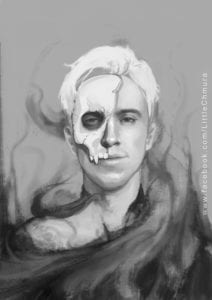
Dumbledore’s illogical and unexplained behaviour is just one of Harry Potter and Half-Blood Prince’s narrative issues, unfortunately. In my opinion, the book also has significant pacing issues that become most obvious in its third quarter.
Essentially, Harry has two significant problems in Half-Blood Prince (in addition to the romance plotlines, of course): he wants to know what Draco is up to, specifically where he is going after he overheard Snape and Draco’s conversation, and he needs to get his hands on Slughorn’s unmodified memory. While the first task has existed almost since the beginning of the book, the second is only given to him at the half-way point of the book after he comes back to Hogwarts after Christmas. But in both cases, it feels like the plot points are resolved too quickly.
It takes Harry almost the entire first half of the book – from tailing Malfoy in Diagon Alley until shortly before Christmas – to get evidence that Ron, Hermione and most other adults around him can’t wave away. After he has overheard Draco and Snape talking about Draco’s mission, though, Harry decides within two chapters to have him tailed by Dobby and Kreacher, and finds out that Draco is using the Room of Retirement, with Crabbe and Goyle as guards, in the chapter after the next one. Less than 30 pages and a week pass between Harry telling Dobby and Kreacher to keep an eye on Draco and receiving their report and concluding where Draco is going. Afterwards, however, Harry again spends weeks trying to get into said room, failing and finding out nothing new.
The problem with Harry’s investigation into Draco’s whereabouts and activities is that it either doesn’t progress at all for extended periods of time or progresses incredibly fast. It’s frustrating because it makes the pacing feel all over the place and Harry’s break-throughs inconsequential. It also could have been easily avoided if Harry had overheard Snape and Draco’s conversation some time around Halloween, for example, then taken until shortly before Christmas until he thought of asking Dobby and Kreacher to tell Malfoy and only found in February or March where Draco was actually going. That way, roughly the same amount of time would have passed between all three developments and it wouldn’t have seemed as if Harry’s realisations were utterly meaningless for extended periods of time.
However, the sense of an unearned resolution is even more present with Harry’s quest to obtain Slughorn’s memory. Harry learns that he has to get the unaltered memory from Slughorn after Christmas and has accomplished the task some time during March or April. Overall, five chapters and about 110 pages pass between Harry being given the task by Dumbledore and him accomplishing it. Harry only attempts twice to get the memory before he takes Felix Felicis and succeeds. Considering that it’s supposed to be an especially difficult task, the resolution doesn’t feel especially earned or hard-worked for. This feeling is strengthened by the fact that it’s ultimately not Harry’s talents or cleverness that allows him to fulfill his task but pure luck.
Additionally, although obtaining the memory is supposedly supremely important, it really doesn’t feel like it is. Dumbledore is already acting as if he had seen Slughorn’s memory because he has enough other evidence to logically conclude that Voldemort has more than one Horcrux. Dumbledore knows that Riddle’s Diary from Chamber of Secrets is a Horcrux based on what Harry told him about it and, based on how carelessly Voldemort handled said diary, and a remark about how he went further on the path to immortality than any wizard before him, he assumes that he made more than one. This leads Dumbledore to the Gaunt’s ring which proves his theory. The memory is ultimately only necessary for the conclusion that Voldemort made seven Horcruxes and nothing else.
Of course this is something you can’t realise if you’re reading the book for the first time, but once you read it again and do realise it, it makes the entire storyline feel pointless. It’s especially frustrating because Harry’s quest to obtain the memory is one of the two most significant things in the fight against Voldemort that he does over the course of the entire book, the other being his investigation of Draco which, as explained before, also suffers from pacing issues and a sense of inconsequentiality.
A Turn for the Worse
The budding romance between Ron and Hermione has been hinted at before, both in Half-Blood Prince and Goblet of Fire, but in the penultimate quarter of the sixth book, it moves from being subtext to being explicit text when Hermione talks about Slughorn’s Christmas Party and Ron, envious because Slughorn is utterly ignoring him in favour of his more famous/talented friends, lashes out at her and tells her to get off with McLaggen. When Hermione tells him that she is allowed to invite guests and was actually planning on taking him, Harry realises where this is headed and begins worrying what this will mean for the Trio’s friendship.
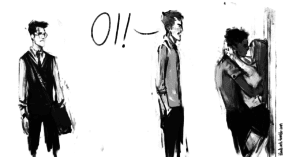
Harry’s worries prove to be justified extremely quickly when Ron acts like a complete and utter dick, especially towards Hermione, after a fight with Ginny. He stumbled over her snogging Dean in an empty corridor and, like the misogynistic Protective Big Brother trope he’s meant to embody, threw a hissy fit. Ginny pointed out that Ron was only acting as if snogging someone was a big deal because he, unlike Hermione and Harry, had never snogged anyone. And then Ron’s jealousy and envy led to him essentially doing a complete 180 from wanting to go to Slughorn’s Christmas Party with her to treating her like she is the dirt beneath his shoe.
Harry’s hope is that his two best friends will get on well if Ron does well in the upcoming Quidditch match. As we all might remember, Ron’s Keeper abilities are patchy at best and especially catastrophic if he’s in a bad mood which leads to Harry sneaking Felix Felicis into Ron’s drink in a way that Hermione notices. Of course Harry didn’t actually give his best friend a potion that would make it illegal for him to participate in a Quidditch match, he just wanted Ron to believe he had so that he’d play as if he was lucky – which is why he needed Hermione to see and call him out. His plan semi-backfires: Ron does great as a Keeper but the rift between him and Hermione only deepens because he is mortally offended that Hermione thought he only played well because of liquid luck.
This is when Ron decides to start dating Lavender Brown which mainly means snogging her in public. Hermione is understandably hurt: after all, Ron and her were obviously moving towards a relationship, then Ron started snapping at her for seemingly no reason and then decided to go out with another girl instead. It doesn’t justify her vicious reaction – she makes a bunch of magically conjured birds physically attack him – but if a boy had acted the way Ron did towards her, I would’ve stopped talking to him, too.
I said in my last reread post that Ron and Hermione ending up with each other was fine with me, but it’s actually less fine with me now, mainly because of Ron’s behaviour. I get that Ron is still supposed to be insecure, immature, and utterly unable to communicate his feelings. But how his inferiority complex makes him lash out but his behaviour towards essentially all of the girls in his life in Half-Blood Prince is fundamentally unacceptable and incredibly heard to read about without intensely disliking him. This is made even worse by the fact that he never apologizes to Hermione; instead they just become friends again after he is accidentally poisoned in Slughorn’s office.
This is a general thread that runs through the books: Ron and Hermione fight, sometimes for good reasons but more often because of Ron’s dickishness, and they make up again when some external factor motivates Hermione to start interacting with Ron again, not when Ron apologizes for his shitty behaviour. I do get that Ron is a teenage boy and that his behaviour is actually quite realistic, but it’s also setting a pretty bad example.
Lavender Brown Deserved Better
Something that also sets an incredibly bad example is the treatment of Lavender Brown. She’s Ron’s first girlfriend and, to be fair, she’s pretty annoying and superficial. She doesn’t seem to have a sense of boundaries and she gets overly invested in the relationship with Ron, but if Ron’s behaviour is excusable because he’s a dumb teenage boy with little experience with relationships, Lavender’s clingyness, the silly nicknames and the embarrassing Christmas present should be just as excusable.
Ron also ultimately treats Lavender like crap, especially after he’s poisoned. He starts to pretend to be asleep when she tries to visit him in the Hospital Wing, he avoids her in the hallways and hides from her and he doesn’t even have the decency to break up with her himself. The worst thing, though, is that I think that we as readers are meant to find it funny: although both Harry and Hermione tell Ron of for how he is acting towards Lavender, there’s a cheeky, amused undertone to it and both of them are grinning about Ron trying to hide from her more than once.
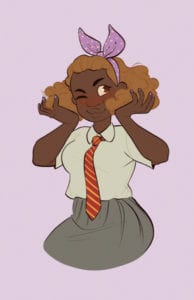
It feels a lot like JKR wants us to hate Lavender but there is no actual reason to. She doesn’t ever do anything actually hate-worthy. It’s not her fault that Ron starts going out with her after promising to go on a date with Hermione, because she couldn’t have known that. Though her trying to talk to Harry about how Ron feels about the relationship is annoying, it’s also unsurprising that, when Ron stops talking to her, she goes to his best friend who she assumes Ron would have talked to. And considering that Ron and Hermione stop talking when Ron starts dating her and then Ron starts ignoring her when Hermione becomes a part of his life again, it makes sense that Lavender is jealous and assuming that Ron’s cheating on her.
Additionally, there’s the fact that Lavender doesn’t really have any discernible character traits that would justify hating her. I’ve been thinking about what I know about her and apart from the fact that she likes Divination, had a pet rabbit in book 3, is best friends with Parvati, giggles a lot, and falls in love with Ron, there really isn’t that much to her character. Considering that she’s been around since Philosopher’s Stone and becomes one of the characters that appears in almost all scenes of the third quarter of Half-Blood Prince, that is very little. She’s barely an actual character and more of a stereotype of the silly sixteen-year-old girl who’s in love with a boy who treats her like crap.
The underlying narrative is ultimately a misogynistic one that wants us to feel sympathy for a guy with a “crazy” girlfriend while ignoring that said guy is treating her terribly. Take the undertone of “feminine girls are silly and shallow” that runs through the entire series into consideration as well and the way Lavender is portrayed becomes just deeply uncomfortable and unfair.
What to make of the Slug Club
Half-Blood Prince not only moves characters like Lavender and Ginny, who’ve existed for the entirety of the series, more into focus, it also introduces us to a new, fundamental character. I’m talking, of course, about Horace Slughorn who supposedly possesses the most important memory and the key to killing of Voldemort.
At the same time, Slughorn probably embodies one of the most fundamental flaws of the Wizarding World and that is its “old boys’ network” mentality. According to Wikipedia, the term
“can refer to social and business connections among former pupils of male-only private schools. The term originated from much of the British elite having attended certain public schools as boys, thus former pupils are “old boys”. […] In popular language, old boy network or old boy society has come to be used in reference to the preservation of social elites in general; such connections within the British Civil Service formed a primary theme in the British Broadcasting Corporation’s satirical comedy series Yes Minister. The phrase “It’s not what you know, it’s whom you know” is associated with this tradition.”
It’s pretty easily visible that the entire Wizarding World, but especially the Ministry, is saturated with the “it’s whom you know” mindset of an old boys network. Lucius Malfoy is probably the best example of that: despite it being a well known fact that he’s a Death Eater, his connection to high-ranking Ministry officials has not only kept him out of prison but, for example, gotten him tickets for the best possible seats at the Quidditch World Cup finale. Similarly, Fudge’s side-eyeing of Arthur Weasley for his love for Muggles and his connection to Dumbledore has supposedly kept him on the lower end of the career ladder.
Slughorn’s “Slug Club” is based on the same mindset of making it possible for people who were members of a specific institution to advance in life in ways that non-members cannot, except that it’s not for members of a specific (type of) school but members of Slughorn’s selected circle instead. Slughorn is the central figure of his own old boys network, something that many real-life old boys networks seem to lack as they are based on attendance of an institution and the connections between those attendees rather than the connection to one specific person, but fundamentally it’s based on the same nepotistic principle.
Interestingly enough, the Slug Club doesn’t just allow those who are well-connected to succeed in life, it also occasionally includes talented students from less-well connected backgrounds like Lily or Hermione. Yes, Slughorn might want to sincerely help the members of his club, and it’s good that he’s giving a leg up to students that otherwise have the “wrong” background to succeed in the Ministry, but his behaviour is fundamentally upholding the system that disadvantages these people in the first place.
Additionally, it is incredibly clear that while Slughorn takes merit into account, it is not nearly as important to him as the well-connectedness of potential members. Hermione is about four times as talented as McLaggen, who seems to be a thoroughly average wizard, but it is the well-connected McLaggen that is Slughorn’s second favourite member of the Slug Club, not Hermione.
The problem is that if JKR means for the Slug Club to be a condemnation of the elitism and nepotism that pervades both the fictional Bristish Wizarding and the real British society – elitism so embedded in the UK that it could be called social engineering, according to a 2014 report by the Social Mobility and Child Poverty Commission – she doesn’t really pull it off. The problem with the Slug Club is that it doesn’t seem like the fundamentally anti-democratic, harmful organisation that it actually is specifically because it does include talented people with the wrong background. These are the kind of people who are usually also left behind in real life because of old boys network, so including them in what is supposed to be a condemnation of them is contradictory.
And its Leader
While I personally find it pretty easy to disapprove of the Slug Club, I find it harder to decide on an opinion on Slughorn himself. He doesn’t seem like he actually has any sort of malicious intentions and most of the harm that he does is done either inadvertently, like when he talks to Tom Riddle about Horcruxes, or due to him being a product of his society. It’s not surprising that Slughorn is a nepotist considering that he was born and raised in a fundamentally nepotistic society and it’s not surprising that he seems to expect Muggleborns to be inherently less magically skilled than other wizards and witches because he has, again, grown up in a society that’s deeply prejudiced against them.
However, while having internalised the prejudices of the society one grows up in doesn’t necessarily make someone a terrible person, it also means that they aren’t an especially good person, in my opinion. I think we’re all morally obligated to become better than the society we live in, to unlearn the harmful mindsets, prejudices and oppressive ideologies that are ingrained into society, so
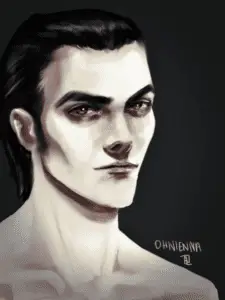
that we can both become kinder people and create a kinder society. There are a whole bunch of characters in the Harry Potter series who are doing this, but Slughorn is not one of them.
At the same time, Slughorn does not seem to have an especially strong moral compass or a spine anyway. Even when he realises that what he told the young Tom Riddle about Horcruxes probably did great damage and that sharing what he said could help Dumbledore defeat him, he is too ashamed to do so. It is more important to him to not have people see him in a bad light than it is to him to defeat Voldemort. It’s a human desire to not have people that you respect or care about see you negatively but the fact that I understand what motivated Slughorn’s actions doesn’t mean I suddenly find them acceptable.
I think as a person I met in real life, I’d be okay with Slughorn. He actually reminds me of one of my English literature professors. But as a fictional character, I find him disappointing, especially because of his narrative role that is, I think, meant to be twofold: Getting his unmodified memory is a quest Harry has to complete for the narrative to progress – I’ve already outlined while this felt fundamentally unsatisfying – but more importantly, Slughorn is supposed to be evidence that not all Slytherin are bad people. Again, JKR doesn’t really pull it off: Slughorn isn’t a Death Eater or a pureblood supremacist, but he favours wizards from old, well-connected families, he’s nepotistic, he’s manipulative and a coward. If Slughorn was meant to disprove the idea that there are no good Slytherins, JKR should have made him a better person.
Join me next time when everything blows up in a quite spectacular fashion.

